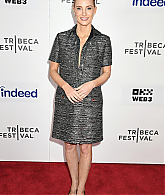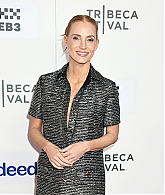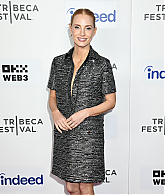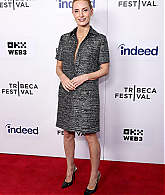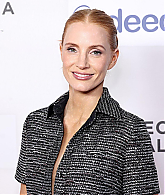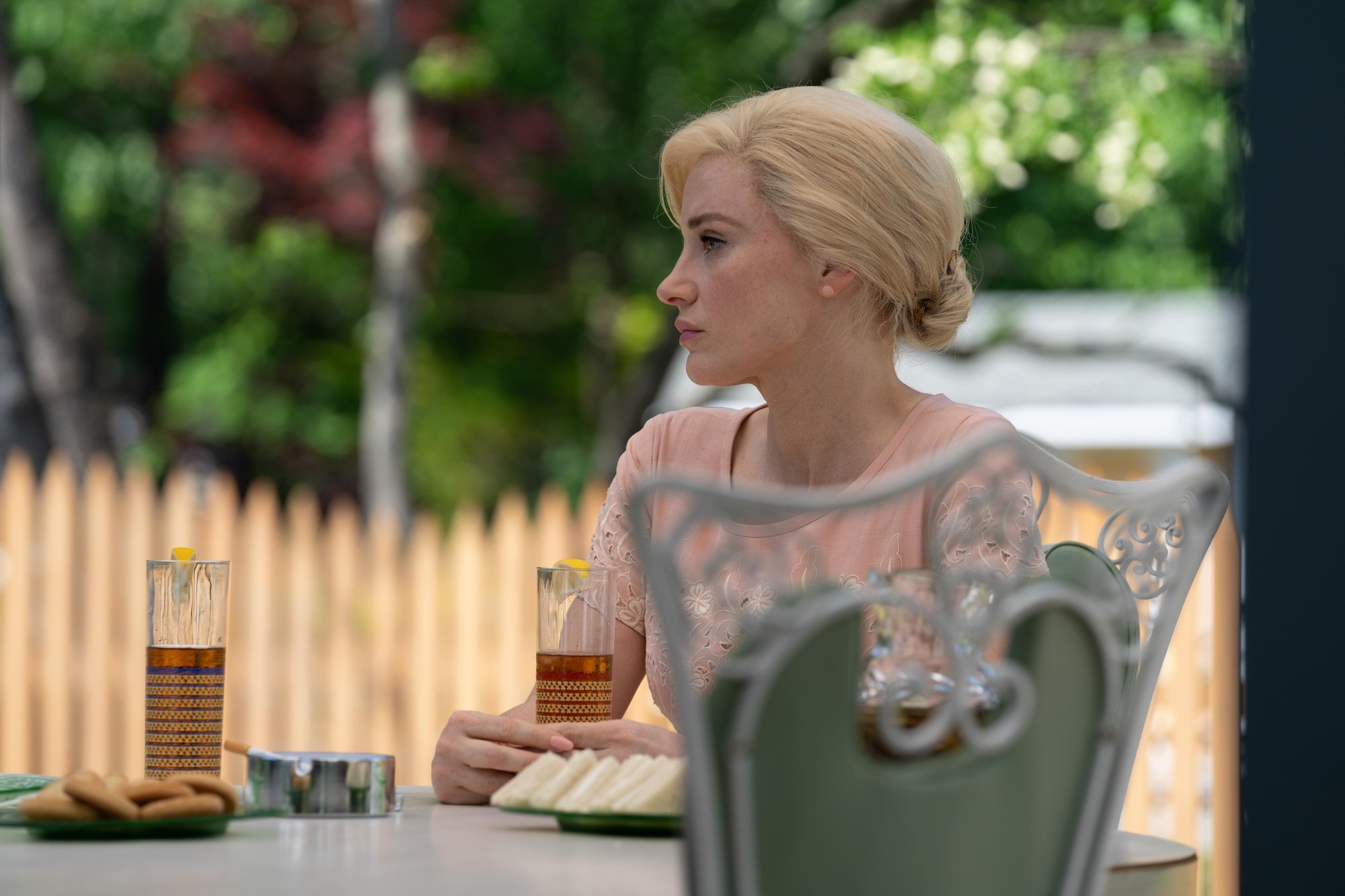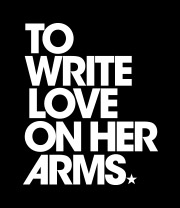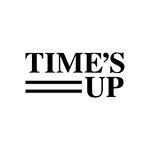 elcome to Jessica Chastain Network, your oldest and most complete resource dedicated to Jessica Chastain. You may better remember her as Molly Bloom in Molly's Game or Maya in Zero Dark Thiry. Academy Award winner for The Eyes of Tammy Faye, Jessica spans her career from big to small screen, seeing her not only in movies like The Help, The Debt, Miss Sloane, Woman Walks Ahead, The Zookeeper's Wife, The Good Nurse, she also played some iconic roles for series like Scenes from a Marriage and George & Tammy. Recently she registered a podcast series, The Space Within, and had a role in Memory and Mothers' Instinct. This site aims to keep you up-to-date with anything Mrs. Chastain with news, photos and videos. We are proudly PAPARAZZI FREE!
elcome to Jessica Chastain Network, your oldest and most complete resource dedicated to Jessica Chastain. You may better remember her as Molly Bloom in Molly's Game or Maya in Zero Dark Thiry. Academy Award winner for The Eyes of Tammy Faye, Jessica spans her career from big to small screen, seeing her not only in movies like The Help, The Debt, Miss Sloane, Woman Walks Ahead, The Zookeeper's Wife, The Good Nurse, she also played some iconic roles for series like Scenes from a Marriage and George & Tammy. Recently she registered a podcast series, The Space Within, and had a role in Memory and Mothers' Instinct. This site aims to keep you up-to-date with anything Mrs. Chastain with news, photos and videos. We are proudly PAPARAZZI FREE!

 elcome to Jessica Chastain Network, your oldest and most complete resource dedicated to Jessica Chastain. You may better remember her as Molly Bloom in Molly's Game or Maya in Zero Dark Thiry. Academy Award winner for The Eyes of Tammy Faye, Jessica spans her career from big to small screen, seeing her not only in movies like The Help, The Debt, Miss Sloane, Woman Walks Ahead, The Zookeeper's Wife, The Good Nurse, she also played some iconic roles for series like Scenes from a Marriage and George & Tammy. Recently she registered a podcast series, The Space Within, and had a role in Memory and Mothers' Instinct. This site aims to keep you up-to-date with anything Mrs. Chastain with news, photos and videos. We are proudly PAPARAZZI FREE!
elcome to Jessica Chastain Network, your oldest and most complete resource dedicated to Jessica Chastain. You may better remember her as Molly Bloom in Molly's Game or Maya in Zero Dark Thiry. Academy Award winner for The Eyes of Tammy Faye, Jessica spans her career from big to small screen, seeing her not only in movies like The Help, The Debt, Miss Sloane, Woman Walks Ahead, The Zookeeper's Wife, The Good Nurse, she also played some iconic roles for series like Scenes from a Marriage and George & Tammy. Recently she registered a podcast series, The Space Within, and had a role in Memory and Mothers' Instinct. This site aims to keep you up-to-date with anything Mrs. Chastain with news, photos and videos. We are proudly PAPARAZZI FREE!
Actress Roundtable: Jennifer Lawrence, Emma Stone and Top Stars on Harassment in Hollywood and Ideas for Industry Change
Matthew Belloni
November 15, 2017
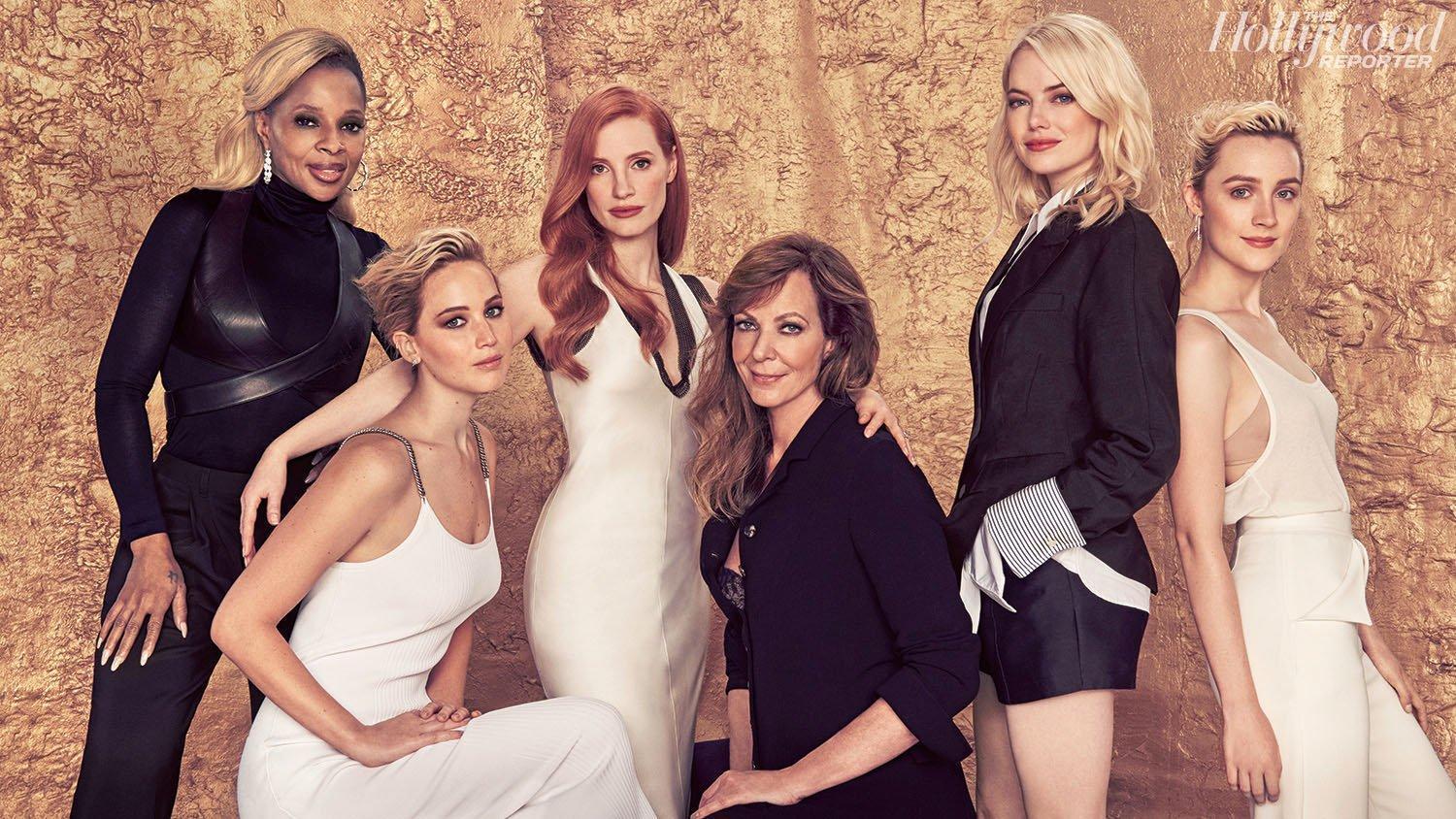
Article taken from The Hollwyood Reporter.
Six top actresses — including Mary J. Blige, Jessica Chastain, Allison Janney and Saoirse Ronan — open up about risky roles and how the industry’s culture of abuse might finally be on the verge of change: “I feel hopeful because we’re not ignoring it anymore.”
Jennifer Lawrence had some advice for recent New York transplant Mary J. Blige on acclimating to life in Los Angeles. “Just make friends with your neighbors, like I did,” Lawrence, 27, said to Blige, 46, before the start of The Hollywood Reporter’s annual Actress Roundtable, held Nov. 11 at Line 204 Studios in Hollywood. The mother! and Mudbound stars were meeting for the first time, but Lawrence is already good friends with fellow Oscar winner Emma Stone, 29. And three of the participants — Stone (Battle of the Sexes), Jessica Chastain (Molly’s Game), 40; and Allison Janney (I, Tonya), 57 — worked together on 2011’s The Help. And all seemed endlessly fascinated by the thick Irish accent of Saoirse Ronan (Lady Bird), 23, so much so that nearly everyone attempted their own Ronan impression before the hourlong conversation was over. Of course, it wasn’t all laughs, especially not this year with the horrors of sexual harassment in the headlines. The actresses came with strong opinions on the subject, which quickly segued into a frank debate on how sexism and harassment are intertwined with the issue of pay inequality in Hollywood. Depressing? Yes, but given the attention on this subject, Janney noted, “It’s exciting to think of our culture changing.”
Let’s rip the Band-Aid off. Headlines in Hollywood have been all about instances of alleged harassment. Some people believe the entertainment industry will never be the same.
JESSICA CHASTAIN I hope the entertainment industry will never be the same. If you look at Louis B. Mayer and Fatty Arbuckle and Jack Warner, if you read Shirley Temple’s book, you find out what happened to her when she was a child — there is a history of abuse against women in our industry, and it’s never been addressed. I’m devastated by all the stories that have come out because it’s heartbreaking, but at the same time I feel hopeful because we’re not ignoring it anymore.
JENNIFER LAWRENCE The big misconception, though, is that this is just in the entertainment industry. Once again, the entertainment industry is kind of the stage on which you can see the inner workings of problems that are all over the world. If a flight attendant comes forward about a pilot, it doesn’t end up in the news because nobody knows about it. That doesn’t mean that there’s less sexual abuse going on anywhere else in the world, in any other place of work. But fortunately, we’re starting the conversation now.
EMMA STONE There’s a really amazing article Brit Marling wrote that was essentially saying, if women were paid equally in every industry, this would not be occurring. Women have had to fit into these different boxes for so many years just to get work, and if these things are happening and they bring them to people’s attention, they are much more likely to be fired or to be dismissed than a man in a more powerful position. So it’s a huge conversation for our industry, but I would hope that this is only the tipping point for us to discuss equal pay for equal work for women across every industry.
Have these stories caused you to look at your career in a different light or re-evaluate any interactions you’ve had?
ALLISON JANNEY I’m very fortunate that I have never experienced any kind of harassment, and the only reason I can think of is that I’m 5-foot-15 and my career didn’t start till I was like 38. I was always aware of the casting couch — that was just something I thought women had to navigate growing up in the business. But it’s exciting to think of a time where kids growing up won’t know what that is, that it will be a thing of the past, and there won’t be any more abuse of power. It’s exciting to think of our culture changing.
SAOIRSE RONAN I was very lucky that I was protected from a lot of that. I never was really exposed to what went on at parties, I was never left on my own with anyone; my mom and dad were always around. The really disappointing thing about all this is that [journalists and others in Hollywood] had all of this shit on all of these men and women for the last few years, but they hadn’t done anything with it. It’s just been swept under the carpet.
Can the culture of leveraging power and the culture of abuse change?
LAWRENCE I hope eventually. I think it’s going to be a while. It’s deeply ingrained, unfortunately. It’s kind of this social proof in some way of your masculinity.
CHASTAIN Whenever you have one demographic that’s in charge of the livelihood of another, you’re going to have abuses of power. [To Blige] I’m interested in your point of view on this in terms of being in music, now being in film, and what you’re seeing.
MARY J. BLIGE Well, in the [music] industry, I never had that problem. I was always kind of a tomboy and one of the guys. I feel sad for the women, but I’m happy that they’re free because they had to hold on to a secret for years. And I believe that things will change because this is making other women say, “Me too,” “Me too,” “Me too” — it keeps happening every day because people are tired of sitting around with that secret that holds them prisoner. Women have been going through this since they were children. As a child, I went through it all the way up until adulthood. When I got in the music business, I never had it because I went through so much of it in childhood.
CHASTAIN But you said you were a tomboy. Do you think you made that decision to shield yourself from it?
BLIGE I did. Because I’ve been through so much as a child and a teenager, I just wore baggier jeans and Timberlands and hats turned backward. It took me a very long time to even wear makeup and tight clothes because I had been through so much. And those secrets I still have to deal with. So hopefully these women are free, because it hurts.
STONE I’m someone who holds in a lot and gets really nervous to speak. We have to recognize that there are so many who haven’t told their stories yet, who aren’t comfortable to share. I feel so much compassion for those who are still getting up and going to work every day with their abuser or have had abuse in their past and who are not ready to say anything. And putting pressure on women to share it, you know, “If you’re not saying it now, then you’re complicit in this evil that’s occurring,” isn’t fair.
BLIGE A lot of people are not ready. When you’re young and you want to be an artist and you want to be an actress, there are people that threaten you to do certain things. And sometimes you [experience] sexual harassment, but you don’t know it is.
LAWRENCE Sometimes — I’ve had this happen: I finally made the decision to stand up for myself, and then I went to go to the bathroom at work and one of the producers stopped me and was like, “You know, we can hear you on the microphone, you’ve been really unruly.” Which was not true, but basically my job was threatened because the director said something fucked up to me and I said, “That’s sick, you can’t talk to me like that,” and then I was punished, and I got afraid that I wasn’t going to be hired again.
STONE Yeah, you were “difficult.”
LAWRENCE Yeah, I was called difficult and a nightmare. I think a lot of people aren’t coming forward because they’re afraid they’re not going to work again. You need to be able to say, “This is wrong” and have somebody do something about it instead of saying, “Oh, it’s wrong? Well, you’re fired.”
Emma, your film is about a woman’s fight for equality and to be taken seriously. What about today’s political climate did you bring to preparation for this role?
STONE We shot Battle of the Sexes in the spring of 2016, so when it comes to our political climate, there was still a lot of hope happening. It was fascinating because it’s a historical event, it happened in 1973, and now we’re here 44 years later and the depressingly relevant facts of the film are very tough to look at. There have been strides made — women can get their own credit card without a male signing for it, which you couldn’t in 1973. And so obviously we have our own credit cards now, which is great, and we’re really, really thankful. (Laughter.)
LAWRENCE That’s enough.
STONE That’s enough. We’re fine. (Laughter.) But there’s such a long way to go. We’re still getting paid less than men across every industry.
Even before the current climate, there was a lot that came out in the Sony hack about equal pay — is that something you bring up before you take on a role?
CHASTAIN I do. A lot of the problem in terms of wage equality, but also in terms of [female] writers and directors coming on to projects, starts at the agency level. I now have a production company, and I’m asking [my agents], “Can you guys send me a list of writers?” And it’s all men. I’m realizing that they’re going to submit the writers that have the higher quote because they get a percentage of the quote. So that’s leading us to why there’s not so many female filmmakers, right? But [with actors], I don’t understand — if you’re a very successful agency and they know what everyone is making on the film — how an agent is OK with you making a third of your co-star’s salary. After Zero Dark Thirty, I was sent a lot of scripts where it was a female protagonist, and they wouldn’t do my deal until they knew who the male actor was because they needed to do his deal first and then see what was left over.
ALL Ugh.
RONAN What?!
CHASTAIN Yeah. And I decided I’m not doing that anymore. So from now on, if someone has something they’re bringing to me, great, let’s do my deal [now]. But also, if someone is showing up for three weeks of a two-month film, they’re not getting paid more than me.
LAWRENCE It’s much easier for me now to be paid fairly. The reason I spoke out about it [after the Sony hack revealed she was paid less than her male American Hustle co-stars] was really — we’re in the industry, everybody is looking at us, if we’re going through this, every woman in the world is going through this. But the real problem is the normalization of it. It’s the reason why your agents don’t think twice about paying you a third of your [co-star’s paycheck] because it’s been so normalized for so long.
JANNEY I do a TV show [CBS’ Mom], two women are the leads, so we’re like, “Damn, we don’t know how much we’re not getting paid!”
Jessica, you just worked with Aaron Sorkin on Molly’s Game, and he has been criticized in the past over some of his female characters — that they don’t control their own destiny. But Allison’s character on Sorkin’s The West Wing was very much in control, as is a character like Molly Bloom.
CHASTAIN What I am so excited about is that for his directorial debut, Aaron Sorkin decided to tell a story with a female protagonist. And he made a film about patriarchy in terms of family, in terms of industry and government and what women have to do to try to navigate the rules of men. And how those rules can change depending on what their whims are. These are actual lines in the movie that he wrote. When I read the script, I was like, “I can’t believe he is telling this story.” Twice in the film men tell Molly she is not presenting herself appropriately physically. Her boss tells her she has ugly clothes, and so she buys really sexy clothes to make her more desirable. Then, later, her lawyer tells her she looks like a Cinemax version of herself and she needs to change her clothes. There is so much in this film that deals with what a woman has to do to try to find some bit of success, to find some sense of power over her own life. And I’m really impressed that Aaron Sorkin, who could have told any story that he wanted, chose to tell that story.
JANNEY I’d love to believe that’s because he has a daughter now.
CHASTAIN I think so. But do you know what he said to me the other day when we were talking about what’s going on in the industry? He said that he was talking to his daughter, Roxy, and saying, “Listen, when you go into the workforce, if a guy grabs you or does something with you, you can scream, you can fight back.” And she turned to him and said, “Dad, why are you teaching me to defend myself and not teaching those guys not to be creeps?” The onus isn’t on women. Society has a way of blaming victims: You didn’t come out soon enough or you’re not asking for enough money. But the onus is on others not to abuse their power.
Jennifer, when you make a film like mother! that you know is going to be polarizing, is there a conversation about that during the process?
LAWRENCE Yeah. We’d start shooting something, and we’d be like, “Well, this is going to go over really well in the center of America.” We would laugh about it, but nobody had any doubts about what we were doing. We spent three months meeting in a warehouse in Brooklyn talking over the themes of the movie. By the time we got [to the shoot], we were rock solid to the point that even when the movie came out and we have an F CinemaScore or something, like 63 percent [on Rotten Tomatoes], nobody is really surprised. We’re just like, “Well, yeah, we knew that when we were on set.” Every time you make a movie, you’re like, “I hope everyone likes it.” This is the first time I’ve made a movie where we knew not everybody is going to like it. I mean, people haaate it.
Are you usually right in how your films will be received?
LAWRENCE I’m not normally right — I have no instincts at all. I just go in blindly, and then while I’m there, I’m like, “Well, who knows?” When I saw Winter’s Bone, I was like, “Well, I better lock up shop, no one’s going to see this.”
CHASTAIN Really?
LAWRENCE It’s so hard because the first time I watch anything, I’m just watching my double chin and my acne, and I’m bloated. (Laughter.)
CHASTAIN Are you crazy?
LAWRENCE Am I the only one?
JANNEY No, I’m the same way. For I, Tonya, I got to do this old-age makeup, and I was like three hours in this makeup, and then I saw myself and I was like, “Oh, my God, this is fantastic. I don’t have to worry about my jowls.” It was so freeing to go and work on a part that I didn’t care what I looked like. Even seeing it, I was like, “Oh, God, I can watch myself because I look so awful.”
STONE I’m laughing because a lot of us at this table were in The Help, and Tate Taylor, the director, made me laugh so much because on the set he goes, “All right, why don’t you just do your teary cry smile?” And I know exactly what it is, it’s like [makes the face] with a tear. “Do your teary cry smile in this scene.” I’ve never done it since. I was like, “Fuck, it’s my teary cry smile moment!” I see it in a movie, and I’m like, “Damn it, teary cry smile.” That’s my shtick.
CHASTAIN Perhaps it’s because I don’t love the way I look normally that when I’m acting — when I watch Molly, who couldn’t be more physically different than I am, or Celia from The Help or all these characters — when I’m watching them, it doesn’t feel like I’m looking at the things that I don’t like about myself. I have a separation, and I can watch the film and not feel like it’s me. In fact, with Molly’s Game, a month before, Aaron started saying, “I think I want Molly to look like you.” And I was like, “What?!” It was out of nowhere. Because if you Google Molly Bloom, she looks like a Kardashian.
LAWRENCE Take it easy. [Lawrence is a vocal Kardashian fan.]
CHASTAIN In the most fabulous way.
LAWRENCE Watch it.
CHASTAIN I feel like if I see myself onscreen, maybe it’s more vulnerable. The first time I saw Zero Dark Thirty, I was like, “Oh, my God.” That I had trouble watching, because it’s me without makeup.
RONAN Because it’s you.
CHASTAIN It felt like watching myself.
BLIGE When I watched Rock of Ages, I was like, that’s Mary J. Blige. (Laughter.) Oh, that’s awful. That’s not supposed to be Mary J. Blige, that’s supposed to be the character. And then I saw Mudbound at Sundance, and when I saw the character, when I saw Florence, I just started crying because it wasn’t me. I was like, “Who is that?” It was the character. I was like, “Wow, OK, I’ve done something.”
CHASTAIN Was it easier for you to watch yourself because you could watch yourself onscreen and think, “That’s a character”?
BLIGE From that moment, I was able to watch — I sat and I watched the whole movie. But before my part, I was trying to direct everyone else: “Look, your part’s coming,” “Oh, you did so good.”
LAWRENCE You sound horrible to sit next to at a premiere. (Laughter.)
BLIGE Everybody’s like, “Shut up, shut up, shut up!” When my part came, I had to look, and it wasn’t me and I cried. So yeah, that was cool. Because I see Mary J. Blige in everything I do. So I’m glad we got rid of her. (Laughter.) For that.
RONAN Bye, Mary, see ya.
Do you think about the morals of the character before you agree to a role?
CHASTAIN Before I signed on, I judged Molly a lot because I saw pictures of her, and I was like, “Hmm.” And then I met her, and I blamed myself for believing this story that the media had given me. But I’ve played villains, I’ve played people who have killed people, and I don’t think you can judge them. I feel more sorry for people who are making mistakes. I have more empathy for the characters who do the wrong thing.
LAWRENCE When I was doing mother! I had never played a character that was so different in her personality than myself. I would continue to just say, “Well, why would she put up with that and why would she say that?” And it’s because she is not me — that’s not how she would handle something. In between “action” and “cut” and when I was preparing, when I was her, I fully understood why she would think that way. But when I was me, I was like, “What an idiot.”
Emma, what is the worst career advice you’ve been given?
LAWRENCE Something I’ve said probably.
STONE Probably something that Jen told me. I don’t know. Probably advice I’ve given to myself.
LAWRENCE She is so hard on herself.
STONE I tend to keep myself prisoner in mistakes that I’ve made, and I kind of need voices like Jen’s — and I’m really lucky, I have a great manager and agent. They’ve always been very [encouraging] about taking chances. And I’ve gotten more excited to play people that are unlike me or where I need to go into different worlds. Now that I am able to see how rewarding it is to lose yourself in someone else’s experience — to find these people that are nothing like you and let their traits infuse your life — I mean, playing Billie Jean King has truly changed my life. She has infused so much into my spirit, it’s incredibly exciting.
How much did you interact? What did you learn from her that you used in the film?
STONE Early on when we met, I sat with her and her partner, Ilana, and we talked for a long time. Then we got each other’s phone numbers and started talking about things, and I realized she had over 40 years of hindsight on those events. So I realized pretty quickly that watching footage of her at that time, studying as much as I possibly could, was going to benefit me in a different way because she was in the midst of so much turmoil and struggle and yet had to put on this public face as essentially the leader of quality in her industry.
You had to be convinced to do that role?
STONE Sort of. Because for a long time I was playing different versions of myself, teary cry smile and all.
LAWRENCE She’s so mean. You’re so mean to my good friend Emily [Stone’s real name].
STONE But as time has gone on, it’s become incredibly rewarding to take risks, to dare, to not be afraid to make mistakes. As the most anxious kid you’ve ever met, my whole life has been defined by, “Please don’t mess up, I can’t mess up.” And that’s changing, which is incredible.
Is there something memorable that an acting coach or mentor has said to you that you carry with you for each performance?
BLIGE Well, my acting coach is one of my friends. So [on Mudbound] I was going through hell in my personal life and I just ran over to her house and threw myself on the floor and started crying. And she was like, “This is what you do.” She didn’t baby me, she said, “You take all of that shit, and you give it to Florence.”
JANNEY Sanford Meisner told me, “Don’t let anyone tell you you’re too tall to act.” (Laughter.)
STONE That’s like that James Dean quote, “How can you measure acting in inches?” They told him he was too short. (Laughter.)
CHASTAIN Al Pacino directed my first film [2013’s Salome], and he said that for film, it has to be real. So whatever you are feeling, the camera is an extension. It can see more into you than your scene partner. Look at it not like it’s a separate thing but like it’s part of your body almost; it has a direct link to your soul. Whatever you’re feeling, you can try to hide it, but the camera is going to get it.
RONAN I did a period film recently [Mary, Queen of Scots], it was set in the 16th century and I was trying to figure out a scene. So much of it is this beautiful, traditional old language, which is great, but it’s very hard to get to the heart of it. I was talking to one of the other actors and he said, “You know, what it comes down to is you just have to talk like a human.” And as soon as he said it to me, I just kind of went, “Oh yeah, that’s actually it.” No matter what era you’re in or what kind of language you’re using, it’s just about remembering that this person is just a human being.
Who’s the actor, living or dead, that you’d most like to meet or collaborate with?
CHASTAIN Gary Oldman and Isabelle Huppert are my favorites. But Isabelle played my mother in a movie [2013’s The Disappearance of Eleanor Rigby]. So Gary Oldman for sure. Since I was a little kid, he is someone that, when you watch from performance to performance — he doesn’t look like himself.
LAWRENCE You never recognize him.
CHASTAIN I’m sure he can go down the street and people don’t recognize him, which is insane to me that people wouldn’t recognize Gary Oldman. But he is a shape-shifter.
LAWRENCE I said that earlier, so I want to say I think Jessica stole that from me.
CHASTAIN Um, in 2012, I did an interview where I said he was my cinematic crush! (Laughter.)
LAWRENCE I’m going to say Bill Murray. But I hate answering these questions because there are just too many.
STONE If I don’t do something with Diane Keaton before the end of time, I don’t know what I’ll do. She is my everything. I love her, I talk about her a little bit too much. I also absolutely love Hank Azaria. He is criminally underrated and brilliant.
BLIGE Frank Sinatra because of course he was a great singer, but I didn’t know he was a great actor like that. Angela Bassett is another one and her (points to Janney) because she is just amazing in Juno. She made me laugh till I cried.
I know it’s hot under these lights — we’re going to have one final question.
LAWRENCE Also the chairs are very hot. If you ever invite me back, please give me a butt doughnut.
JANNEY Oh, God, that would be good.
CHASTAIN Not a doughnut to eat.
LAWRENCE Not a mouth doughnut. Or sure, either one.
Is there a line from one of your films, one of your characters, that sticks with you?
LAWRENCE “You are not a stand-up guy.” That’s from Silver Linings Playbook, and whenever David [O. Russell, who wrote and directed the film] makes me mad, I always say it to him.
How often is that?
LAWRENCE Yesterday. (Laughter.)
CHASTAIN Whenever someone recognizes me, they always say, “I’m the motherfucker who found this place, sir” [from Zero Dark Thirty]. It’s good.
RONAN “Adapt or die, think on your feet — or think on my feet — even when I’m sleeping.” From [the 2011 thriller] Hanna. Her dad is basically preparing her, and she’s got all of this drilled into her head in order to go out into this world that she knows nothing about. But that’s quite a good thing to remember, to just adapt to every situation that you’re in as much as you can.
JANNEY I have a good one that actually I’ve wanted to say in probably every movie I’ve ever done, but I get to say it in [I, Tonya]. “Well, my storyline is disappearing. What. The. Fuck?”
BLIGE “Love is a kind of survival.” Florence Jackson.
STONE “Piss off, Quiznos.” That’s from Easy A. I shove a Quiznos guy and say, “Piss off, Quiznos.”
JANNEY That’s awesome. I just watched it last night.
LAWRENCE I auditioned for Easy A. I wanted it so bad.
STONE Well, guess what? (Laughter.) You didn’t get it. You didn’t get it because you suck!
LAWRENCE Outside!




